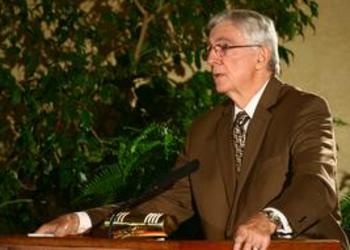Sound Doctrine is of Critical Importance to the Work of the Church

Cincinnati, Ohio—Donald Ward clearly spelled out how sound doctrine is central to the work of the Church, specifically with regard to this year’s theme at the General Conference of Elders, “Transforming Lives Through the Spirit and Word of God.” The address, given Monday, May 7, at the Holiday Inn conference center where the GCE was held, centered around four key scriptures found in Paul’s writings to Titus and Timothy. “For the time will come when they will not endure sound doctrine, but according to their own desires, because they have itching ears, they will heap up for themselves teachers,” wrote Paul to Timothy in his second epistle (2 Timothy 4:3). The Greek word for “sound” is a medical term meaning “healthy and pure,” and the Greek word translated “doctrine” means “teaching.” Simply said, sound doctrine is the teaching that will keep us spiritually well.
There are three aspects of preaching sound doctrine given in 2 Timothy 4:2. First is that of “reproving,” which is more perfectly translated from Greek to mean “convict.” In order to convict someone, you must first be convicted yourself. Listeners will discern readily whether or not you are convicted about what you are teaching. This conviction comes through study, prayer and meditation. Teachers of the Word of God should pray that God will give them each the conviction and passion necessary to stir up the brethren and set their congregations on fire.
Second is “rebuking,” which is more perfectly translated from Greek “to judge, admonish, sharply charge.” Isaiah the prophet echoed this same concept when he recorded, “Cry aloud, spare not; Lift up your voice like a trumpet” (Isaiah 58:1). We must declare the whole counsel of God. Jesus preached with authority, astonishing those of his day by that authority. Paul’s teaching to the Corinthians was not excellent in form, but he led them to have faith in the power of God, not in excellence of speech (1 Corinthians 2:1-5).
Third is “exhorting,” which means to encourage, strengthen and comfort.
Paul emphasized sound doctrine in his writing to Titus. He wrote that a bishop must “be able by sound doctrine both to exhort and to convince the gainsayers” (Titus 1:9, KJV). It is by the Word of God that one can convict a gainsayer.
Encouraging and teaching every member of the Body to be renewed inwardly day by day in the newness of Christ is of utmost importance; it is a critical factor if anyone hopes to survive in this present evil age. The model prayer given by Jesus included, “Give us this day our daily bread.” Not only did He mean the physical bread of sustenance, but the spiritual Bread of inward spiritual renewal.
So many fell away in years past because they were not grounded in sound doctrine and did not have a personal relationship with God and Jesus Christ. The ministry must teach sound doctrine continually and emphasize the need for brethren to grow in grace and knowledge.
Dr. Ward concluded by urging everyone in attendance that we must boldly proclaim the answers to the great questions of life, especially concerning the nature of God and what our great potential is. The truth sets us free from fear, ignorance, superstition and the doctrines of men. Stir up the Spirit of God and set our congregations on fire with the words of Spirit and life.


